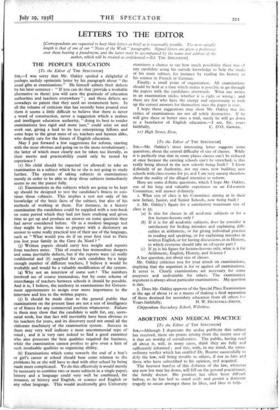[To the Editor of THE SPECTATOR]
35.
Is this for classes in all academic subjects or for a few lecture-lessons only ?
(b) If it is for all academic subjects, does he consider it satisfactory for finding mistakes and explaining diffi- culties in arithmetic, or for giving individual practice in reading and speaking, or for explaining mistakes in written English, or for having discussions, as in History, in which everyone should take an adequate part ?
(c) If 35 is his figure for lecture-lessons only, what is it for Arithmetic, English, History, and Science ?
A last question, not about size of classes.
Mr. Oakley criticises you for your attack on examinations, implying that the argument is for or against all examinations. It never is. Clearly examinations are necessary for some purposes and undesirable for others. The examination argument is always about particular examinations. My question is this.
3. Does Mr. Oakley approve of the Special Place Examination at the age of about at as a means of making a final separation of those destined for secondary education from all others ?-
SIR,—Mr. Oakley's most interesting letter suggests some questions, about the central difficulty of size of classes. While it is perfectly true that in some places classes can't be reduced- at once because the existing schools can't be stretched, is this really being altered in the new schools being built ? I know. definitely of an Authority, not my own, now building new schools with class-rooms for 5o, and I am very uneasy therefore about the reality of the alleged intention to reform.
Here are some definite questions, which I hope Mr. Oakley, out of his long and valuable experience on an Education Committee, will answer definitely.
r. What size of class is his Committee aiming at in their new Infant, Junior, and Senior Schools, now being built ?
2. Mr. Oakley's figure for a satisfactory maximum size of class is (a)


































 Previous page
Previous page